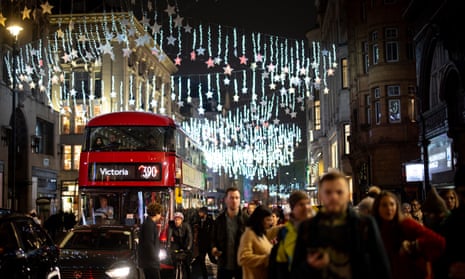The UK economy unexpectedly grew by 0.1% in November as consumers headed to the shops in the run-up to Christmas and pubs and bars enjoyed a boost from the men’s World Cup.
Raising the government’s chances of avoiding a long recession, City economists said hard-pressed consumers had proved more resilient than forecast despite the cost of living crisis.
However, business groups warned that the economy was likely to suffer over the coming months as higher mortgage rates and the withdrawal of state support for energy bills begin to hit disposable incomes further.
A downturn in the manufacturing sector also limited the strength of the economy and meant that over the three months to November the economy contracted by 0.3%, according to the Office for National Statistics.
The British Chambers of Commerce said it was significant that the boost to consumer-facing industries, including retail, wholesale and hospitality, had failed to overcome a dramatic loss of sales compared with pre-pandemic levels.
“The figures provide further evidence that UK economic growth is heading in the wrong direction despite this period normally being among the busiest for the retail sector.
“While month-on-month GDP grew by 0.1%, this is a volatile measure. The three-month average, standing at –0.3%, sends a clearer signal of the current trajectory of the economy,” it said.
The ONS said that sectors selling directly to consumers had suffered an 8.5% fall in income since February 2020 and that unlike other G7 countries, the whole economy remained smaller than it was three years ago.
Cost of living pressures are likely to become more acute this year as tax rises and the withdrawal of government subsidies take effect.
Ministers are poised to increase unit gas and electricity prices for consumers from April, pushing the average bill to £3,000, up from £2,500. Meanwhile, interest rate rises by the Bank of England mean average annual payments for millions of mortgage holders will increase by £3,000.
The Bank of England has warned that the UK is probably set for a long recession, as defined by two consecutive quarters of contraction. The economy shrank by 0.3% in the third quarter between July and September, and figures for the October to December period will be published next month, confirming whether or not the economy entered recession at that point.
Samuel Tombs, the chief UK economist at Pantheon Macroeconomics, said the verdict “hangs in the balance” but it was almost certain a recession was coming in the first half of 2023.
“Looking ahead, we continue to think that GDP will drop substantially in the first and second quarters of this year.”
after newsletter promotion
James Smith, a senior economist at ING, downplayed the prospect of the UK suffering a bigger downturn than other developed nations.
“We’re looking for a peak-to-trough fall in GDP of a little more than 1.5%, which would match closest with the early 1990s recession in terms of scale,” he said.
“And despite the UK’s many woes, particularly in the jobs market, we aren’t convinced Britain will be a serious outlier from the rest of Europe on the hit to GDP this year, even if it probably does sit in the bottom half of the pack.”
Analysts have warned that some of the trends in the data were difficult to judge after a series of events that distorted the usual pattern.
November’s 0.1% rise represented a slowdown compared with 0.5% growth in October, when the economy rebounded from a weak September, caused in part by the closure of many businesses for the Queen’s funeral. A Reuters poll of City economists predicted the economy would shrink by 0.2 % in November.
Jeremy Hunt said his priority was to bring down inflation to alleviate the cost of living crisis and revive the economy.
“We have a clear plan to halve inflation this year – an insidious hidden tax which has led to hikes in interest rates and mortgage costs, holding back growth here and around the world,” the chancellor said.
